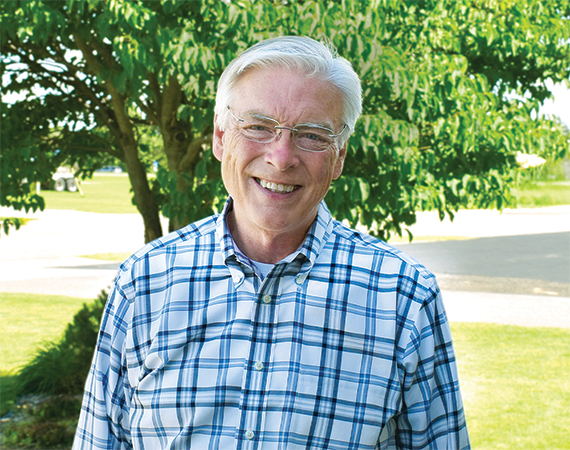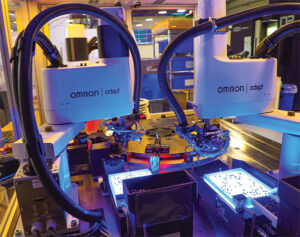Tim Penny joined the Southern Minnesota Initiative Foundation as president/CEO in April 2007. Born and raised in southeastern Minnesota, Penny represented the area for six years in the Minnesota State Senate and 12 years in the U.S. House of Representatives. His dedication to the region dovetails with the Southern Minnesota Initiative Foundation’s mission to keep its 20-county region economically vibrant.
The Southern Minnesota Initiative Foundation is a key advocate for manufacturing. What drives that support, and which activities most directly impact manufacturers in the region?
Tim: Our motto is “Collaborating for Regional Vitality,” and manufacturing is a huge part of that. If there is a longstanding manufacturing facility, one that’s healthy and has a good number of employees, it can keep a small town vibrant. For us, manufacturing means jobs, and we support it through three areas of work: early childhood, entrepreneurship, and small towns.
For 15-plus years, manufacturers have talked about childcare concerns. They hear from their workers that it’s a huge challenge. We make 20-some grants every year to organizations that are trying to improve their childcare offerings. We give away roughly 25,000 early reader books to 60 or 70 organizations each year. We offer dozens of early childhood provider trainings each year at no cost. We also have an expert on staff who works with communities to assess their childcare needs and develop solutions that are tailored to their situations.
We also do a lot of work with entrepreneurship. Some of that is lending — we have about 120 loans in our portfolio right now — in cooperation with area bankers. We have a pretty good success rate with the businesses we’ve assisted, many of which are manufacturers.
And we do some work with smaller towns in our region, including annual grants and an annual paint program. We help small towns create and maintain community funds. A thriving small town helps all employers, including manufacturers, attract and retain employees.
What gives you hope about the future of Greater Minnesota?
Tim: We don’t get directly involved in workforce issues, but we are at the table when these issues are addressed. In the last decade, there’s been valuable work done to address the workforce situation in our region, including a resurgence of interest in technical training programs. South Central College, Riverland Community College, and Southeastern Technical College have been more deliberate about identifying the skills needed and providing training programs around those skills. Many high schools in our area have also returned to vocational technical coursework.
We also have local leadership that wants to accommodate growth. In Albert Lea, for example, the City, the Albert Lea Economic Development Agency, and the Chamber of Commerce recently came together to help two different companies come into the area — converting a former plant and finding space in an industrial park to accommodate their needs. That’s just one example of how communities are supporting existing industry while being receptive to new firms coming to town.
And, some of our young people are coming back to rural areas after leaving for a few years. That’s driven by a variety of factors — a return to roots, quality of life, and cost of living. For young people who have an inclination toward technical trades, we’re doing a much better job of raising awareness of the good paying jobs in our region that require those skills and offering training in those areas.
How does the Southern Minnesota Initiative Foundation work with Enterprise Minnesota to support manufacturers?
Tim: We have an Enterprise Minnesota manufacturing peer group that has met regularly in our office for close to 20 years. Between our loan clients, our donors, and our manufacturing peer group, we have a database of manufacturers that we invite to participate in the State of Manufacturing® focus groups and survey roll out. We always work hand in glove with Enterprise Minnesota in promoting those events in our region.
I also participate in manufacturing tours with legislators when I can. These are huge. Legislators tend to be generalists; they know a little bit about everything. The more we can inform them about the importance of manufacturing to the vitality of the community, the importance of manufacturing to good paying jobs for area workers, and the challenges faced by the manufacturing sector, the better.
You’ve had some terrific jobs — including representing this region in Congress. Heading into your 18th year as the leader of the Southern Minnesota Initiative Foundation, what keeps you going?
Tim: Southern Minnesota keeps me going. My family goes back five generations, and I had the honor of serving this area in the Minnesota Legislature and then Congress for a dozen years. I know it’s a tired old phrase, but I always say it’s an affair of the heart. The Southern Minnesota Initiative Foundation and its five sister foundations came into existence when I was in Congress and we were going through the farm crisis. The foundations were created to invest in the future vitality of their respective rural regions. We have resources we can bring to the table that will move the needle, whether in early childhood or business lending or small-town grant making. We try to be a good partner with others who are working in this same space. In everything we do, we’re trying to figure out how to be a helpful complement and a helpful supplement to what others are doing to make a difference.


